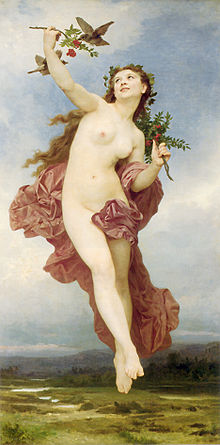Hemera

Allegorical representation of the Hemera by William-Adolphe Bouguereau (1881).
Hemera ( Greek Ἡμέρα Hēméra ) is the personification of the day in Greek mythology .
According to Hesiod, Hemera is the daughter of Erebos and Nyx ("night"). According to Hyginus Mythographus , however, she and the Nyx descend from Chaos and give birth to the children Gaia , Uranos and Thalassa to the Aither . As a child, Cicero only mentions Uranos, with Aither and Eros being the brothers of Hemera. Finally, Bakchylides names Hemera a child of Kronos and Nyx.
Every morning she climbs up from the underworld, Hades , where she has a room, which is then occupied by the night that leaves the upper world on the other side.
Hemera is also identified with Eos , the dawn .
literature
- Wilhelm Drexler : Hemera 1 . In: Wilhelm Heinrich Roscher (Hrsg.): Detailed lexicon of Greek and Roman mythology . Volume 1,2, Leipzig 1890, Col. 2032 f. ( Digitized version ).
- Georg Weicker : Hemera. In: Paulys Realencyclopadie der classischen Antiquity Science (RE). Volume VIII, 1, Stuttgart 1912, Col. 230 f.
Web links
Commons : Hemera - collection of images, videos and audio files
- Hemera in the Theoi Project (English)